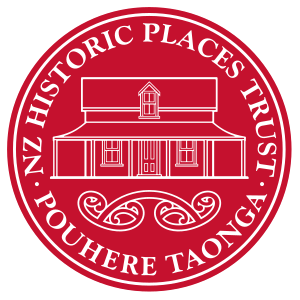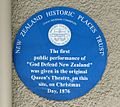Heritage New Zealand facts for kids
|
Pouhere Taonga
|
|

New Zealand Historic Places Trust logo
|
|
| Type | Crown entity |
|---|---|
| Purpose | Protecting New Zealand's heritage |
| Headquarters | Antrim House, Boulcott Street |
| Location |
|
|
Region served
|
New Zealand |
|
Chair
|
Hon. Marian Hobbs |
|
Main organ
|
Board of Trustees |
| Affiliations | Minister for Arts, Culture and Heritage Ministry for Culture and Heritage Department of Conservation Te Puni Kōkiri |
|
Budget
|
NZ$12,975,000 |
Heritage New Zealand Pouhere Taonga is an organisation that helps protect old buildings and important historical places in New Zealand. It was first called the National Historic Places Trust. Later, its name changed to the New Zealand Historic Places Trust. Since 2014, it has been known as Heritage New Zealand Pouhere Taonga.
This group works to find, protect, and save New Zealand's history and culture. It is a special type of government organisation called a Crown entity. This means it works for the government but also has some independence.
Contents
How Heritage New Zealand Started
The idea of protecting New Zealand's history began a long time ago. In 1932, a special piece of land was given to the nation. This was the place where the Treaty of Waitangi was signed. Many people see this as the start of formal heritage protection in New Zealand.
People talked more about protecting historical sites in 1940. This was during the 100-year celebration of the Treaty of Waitangi. Later, in 1943, the government bought Pompallier House. This made people think more about how to look after old buildings.
Setting Up the Trust
A politician named Duncan Rae suggested creating a heritage organisation. He tried to pass a law to make this happen. Even though his specific law didn't pass, the government took on the idea.
In 1954, the Historic Places Act 1954 was passed. This law created the National Historic Places Trust. It started as a non-government organisation (NGO). The Trust had a board of 12 members and a chairman. They had their first meeting in 1955. The Trust worked under the Minister of Internal Affairs.
Name Changes and Growth
In 1963, the organisation's name changed to the New Zealand Historic Places Trust. In its early days, the Trust worked on important projects. For example, they recorded Māori rock paintings. Some of these sites were going to be covered by water from new dams.
The Trust also bought Te Waimate mission in 1961. This is the second-oldest building in New Zealand. In Akaroa, they helped the local council buy the Eteveneaux cottage. This cottage is important for Akaroa's French history.
In 2004, the New Zealand Historic Places Trust became a Crown entity. This meant it became more closely linked to the government. On April 14, 2014, its name changed again to "Heritage New Zealand". Later that year, a new law was passed. This law, called the Heritage New Zealand Pouhere Taonga Act 2014, made the name change official. It also completed the shift from being an NGO to a Crown entity.
How Heritage New Zealand is Run
Heritage New Zealand is managed by a board. The Minister for Arts, Culture and Heritage chooses the people on this board. Currently, Hon. Marian Hobbs is the Chair of the board.
There is also a special group called the Māori Heritage Council. This council helps make sure Māori heritage is protected. Sir John Clarke is currently the Chair of this council.
The main office for Heritage New Zealand is in Antrim House in Wellington. They also have offices in other cities. These include Kerikeri, Auckland, Tauranga, Christchurch, and Dunedin.
Magazine Publication
Heritage New Zealand publishes a magazine. It is called Heritage New Zealand. This magazine comes out four times a year.
Buildings Owned by Heritage New Zealand
Heritage New Zealand owns several important buildings. These include:
- the Kerikeri Mission House
- the Stone Store
- Hurworth Cottage
- Te Waimate Mission house
- Clendon House in Rawene
The Clendon family papers are also stored at Clendon House. These important documents are listed on the UNESCO Memory of the World Aotearoa New Zealand Ngā Mahara o te Ao register.
New Zealand Heritage List / Rārangi Kōrero
The New Zealand Heritage List is a very important record. It lists places that have special historical or cultural value. It used to be called the Register.
The list has five main types of places:
- Historic Places
- Historic Areas
- Wāhi Tapu (these are Māori sacred sites)
- Wāhi Tapu Areas
- Wāhi Tūpuna – these are places important to Māori because of their ancestors and cultural values.
Historic places on the list are put into two categories:
- Category 1 – These are places with "special or outstanding historical or cultural heritage significance or value." This means they are very important.
- Category 2 – These are places with "historical or cultural heritage significance or value." They are important, but perhaps not as outstanding as Category 1.
As of 2014, there were over 5,600 entries on this list. Some historic buildings in Christchurch were damaged. This happened during the earthquakes in 2010 and 2011. Because of rebuilding, many heritage buildings in Christchurch have been lost.
Māori Heritage Council
The Māori Heritage Council (MHC) is part of Heritage New Zealand Pouhere Taonga. It was created by the Historic Places Act 1993.
The Council has several important jobs:
- It helps protect and register wahi tapu (sacred sites) and wahi tapu areas.
- It helps Heritage New Zealand include a bicultural view in its work. This means considering both Māori and Pākehā (New Zealand European) perspectives.
- It helps Māori families (whānau), sub-tribes (hapū), and tribes (iwi) look after their heritage.
- It looks at suggestions about archaeological sites.
- It speaks up for Māori heritage at public and Māori meetings.
As of 2014, Sir John Clarke was the chair of the Māori Heritage Council.
Gallery
-
Fyffe House, Kaikōura
-
Mission House, Kerikeri
-
Stone Store, Kerikeri
-
Historic Places Trust blue plaque in Dunedin at the site of the first performance of God Defend New Zealand
Similar Organisations Around the World
Many other countries have organisations like Heritage New Zealand. They also work to protect their historical places. Here are a few examples:
 France – Monument historique
France – Monument historique Germany – Deutsche Stiftung Denkmalschutz and National Heritage Sites (Kulturdenkmal)
Germany – Deutsche Stiftung Denkmalschutz and National Heritage Sites (Kulturdenkmal) Hong Kong – Historic building, see List of Grade I historic buildings in Hong Kong, List of Grade II historic buildings in Hong Kong and List of Grade III historic buildings in Hong Kong
Hong Kong – Historic building, see List of Grade I historic buildings in Hong Kong, List of Grade II historic buildings in Hong Kong and List of Grade III historic buildings in Hong Kong Netherlands – Rijksmonument
Netherlands – Rijksmonument United Kingdom – Listed building or Scheduled Ancient Monument
United Kingdom – Listed building or Scheduled Ancient Monument United States – National Register of Historic Places and National Historic Landmark
United States – National Register of Historic Places and National Historic Landmark
See also
- SAHANZ (Society of Architectural Historians of Australia and New Zealand)
- Category:Heritage New Zealand
- Category:Lists of historic places in New Zealand
 | Dorothy Vaughan |
 | Charles Henry Turner |
 | Hildrus Poindexter |
 | Henry Cecil McBay |








